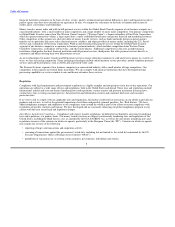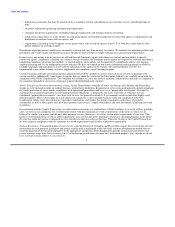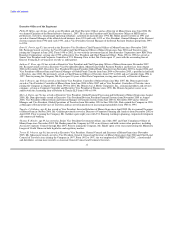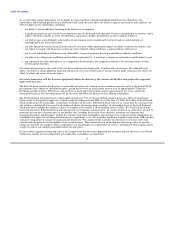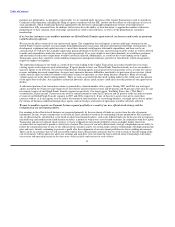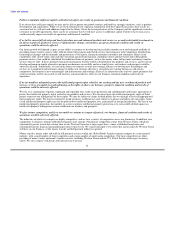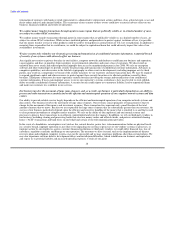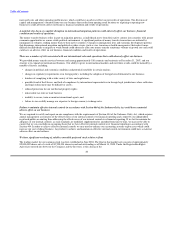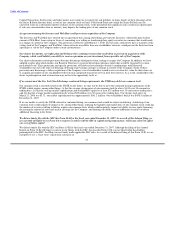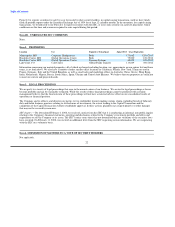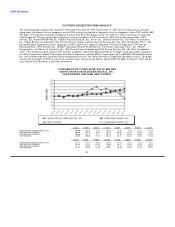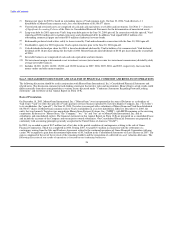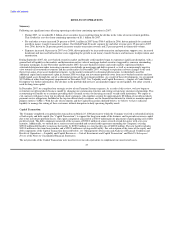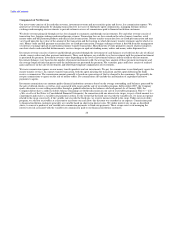MoneyGram 2007 Annual Report Download - page 21
Download and view the complete annual report
Please find page 21 of the 2007 MoneyGram annual report below. You can navigate through the pages in the report by either clicking on the pages listed below, or by using the keyword search tool below to find specific information within the annual report.
Table of Contents
termination of contracts with banks or retail representatives, administrative enforcement actions and fines, class action lawsuits, cease and
desist orders and civil and criminal liability. The occurrence of one or more of these events could have a material adverse effect on our
business, financial condition and results of operations.
We conduct money transfer transactions through agents in some regions that are politically volatile or, in a limited number of cases,
are subject to certain OFAC restrictions.
We conduct money transfer transactions through agents in some regions that are politically volatile or, in a limited number of cases, are
subject to certain OFAC restrictions. While we have instituted policies and procedures to protect against violations of law, it is possible
that our money transfer service or other products could be used by wrong-doers in contravention of U.S. law or regulations. In addition to
monetary fines or penalties that we could incur, we could be subject to reputational harm that could adversely impact the value of our
stockholders' investments.
We face security risks related to our electronic processing and transmission of confidential customer information. A material breach
of security of our systems could adversely affect our business.
Any significant security or privacy breaches in our facilities, computer networks and databases could harm our business and reputation,
cause inquiries and fines or penalties from regulatory or governmental authorities and cause a loss of customers. We discovered an
unlawful data server attack and suffered potential improper data access by unauthorized persons in late 2006. We rely on encryption
software and other technologies to provide security for processing and transmission of confidential customer information. Advances in
computer capabilities, new discoveries in the field of cryptography or other events or developments, including improper acts by third
parties, may result in a compromise or breach of the security measures we use to protect customer transaction data. We may be required
to expend significant capital and other resources to protect against these security breaches or to alleviate problems caused by these
breaches. Third-party contractors also may experience security breaches involving the storage and transmission of our confidential
customer information. If users gain improper access to our or our contractor's systems or databases, they may be able to steal, publish,
delete or modify confidential customer information. A security breach could expose us to monetary liability, lead to reputational harm
and make our customers less confident in our services.
Our business involves the movement of large sums of money, and, as a result, our business is particularly dependent on our ability to
process and settle transactions accurately and on the efficient and uninterrupted operation of our computer network systems and data
centers.
Our ability to provide reliable service largely depends on the efficient and uninterrupted operation of our computer network systems and
data centers. Our business involves the movement of large sums of money. Our revenues consist primarily of transaction fees that we
charge for the movement of this money and investment revenues. These transaction fees represent only a small fraction of the total
amount of money that we move. Because we are responsible for large sums of money that are substantially greater than our revenues, the
success of our business particularly depends upon the efficient and error-free handling of the money that is remitted to us and that is used
to clear payment instruments or complete money transfers. We rely on the ability of our employees and our internal systems and
processes to process these transactions in an efficient, uninterrupted and error-free manner. In addition, we rely on third-party vendors in
our business, including clearing and processing banks that clear our money orders and official checks, and process automated clearing
house ("ACH") transactions and bank wires on our behalf and certain of our telecommunications providers.
In the event of a breakdown, catastrophic event (such as fire, natural disaster, power loss, telecommunications failure or physical break-
in), security breach, improper operation or any other event impacting our systems or processes or our vendors' systems or processes, or
improper action by our employees, agents, customer financial institutions or third party vendors, we could suffer financial loss, loss of
customers, regulatory sanctions and damage to our reputation. The measures we have enacted, such as the implementation of disaster
recovery plans and redundant computer systems, may not be successful and we may experience problems other than system failures. We
may also experience software defects, development delays and installation difficulties, which would harm our business and reputation
and expose us to potential liability and increased operating expenses. Certain of our agent
18


